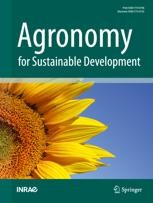Researchers call for comprehensive transformation of food systems
In order to meet the Sustainable Development Goals and the Paris Agreement on climate, researchers propose a four-pillar strategy
Heidelberg | New York, 9 August 2018
 Agriculture and food systems policies should ensure more than just the supply of food. Decision-makers must make a paradigm shift to align policies about climate, agriculture and food with the United Nation’s 2030 Agenda for Sustainable Development. This is according to a group of international researchers in a review article in the journal Agronomy for Sustainable Development, which is published under the Springer imprint and is an official journal of the Institut national de la recherche agronomique (INRA).
Agriculture and food systems policies should ensure more than just the supply of food. Decision-makers must make a paradigm shift to align policies about climate, agriculture and food with the United Nation’s 2030 Agenda for Sustainable Development. This is according to a group of international researchers in a review article in the journal Agronomy for Sustainable Development, which is published under the Springer imprint and is an official journal of the Institut national de la recherche agronomique (INRA).
In 2015, world leaders unanimously agreed on the 2030 Agenda for Sustainable Development, its seventeen Sustainable Development Goals and 169 targets. This set in motion a universal and integrated action plan for developed and developing countries to help people and the planet, and to allow for prosperity, justice and partnerships. Its focus on climate action also aligns it with the Paris Agreement about climate change.
Following these negotiations, the then UN Secretary General Ban Ki-moon convened an informal high-level meeting of experts and policymakers in Italy on World Food Day 2015. This “Milano Group” shared views about a strategic narrative, actions and opportunities that link climate, agriculture and food. The gathering concluded that food systems must be transformed on scale to achieve the Sustainable Development Goals and the Paris Agreement. Transformation should provide multiple and simultaneous social, economic and environmental outcomes, including poverty eradication and mitigation and adaptation to climate change. This implied a radical shift towards the transformation of food systems, agriculture and rural livelihoods.
“After examining the links between sectors and the evolution of the role of agriculture for development, and building on the outcomes of the Milano Group’s discussions, we conclude that we need to implement a comprehensive transformation, moving beyond food supply as the basis for food systems,” says Patrick Caron of CIRAD in France, who is lead author of the review.
The researchers say the comprehensive transformation of food systems should rely on four pillars: first, food systems should enable all people to benefit from nutritious and healthy food; second, they should reflect sustainable agricultural production and food value chains; third, efforts should mitigate climate change and build resilience; and finally, these transformations should encourage a renaissance of rural territories.
“We need consistency between global actions for sustainable development and numerous local-level innovations,” says Caron.
Implementing such transformation plans calls for the availability of suitable metrics to guide decision-making, a synergy in policies that entwines local and global priorities, and enhancing development approaches that focus on territories. The authors acknowledge that such efforts will face challenges – especially due to the different expectations on local and national levels.
Reference: Caron, P. et al (2018). Food systems for sustainable development: proposals for a profound four-part transformation, Agronomy for Sustainable Development DOI: 10.1007/s13593-018-0519-1
Further Information
Services for Journalists
The full-text article is available to journalists on request.
Contact
Elizabeth Hawkins | Springer Nature | Communications
tel +49 6221 487 8130 | elizabeth.hawkins@springer.com
